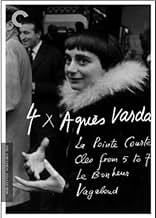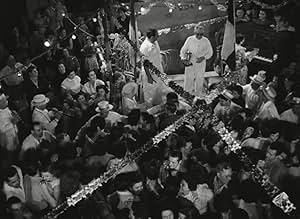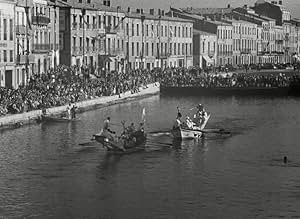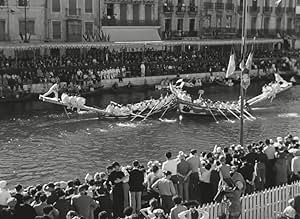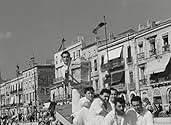VALUTAZIONE IMDb
7,0/10
4589
LA TUA VALUTAZIONE
Aggiungi una trama nella tua linguaFollow the story of a couple who goes to a small French fishing village to try to solve the problems of their deteriorating marriage.Follow the story of a couple who goes to a small French fishing village to try to solve the problems of their deteriorating marriage.Follow the story of a couple who goes to a small French fishing village to try to solve the problems of their deteriorating marriage.
- Regia
- Sceneggiatura
- Star
Recensione in evidenza
La Pointe-Courte was the first feature written, edited (in part, with Resnais) and directed by Agnes Varda, but she came previously from still photography, and her clarity, empathy and specificity with a place and it's many details, from the rocks of the shore to how the water shimmers to the plethora of cats (and of course someone even comments on that), is evident right away. At time of writing this, I don't know the full backstory of how she came to become close and immerse herself with the people in this seaside town or village or whatever you call it, but they clearly are open to her and welcoming for her to see and show us all how they fish and talk among themselves and discuss matters important to them- such as outsiders coming in to tell them what to do. And sometimes we get to look close at a detail like how small snakes and crabs go into a bucket.
I don't think Varda would use this term, but like La Terra Trema or Stromboli, it's a depiction of a time and place, in crisp black and white 35mm film, that is authentic and unvarnished and a bit neo-realist-y. She also places a love story at the center which is coming apart at the seams, and in case it isn't clear the man and the woman walk and talk for minutes on end and speak on their hopelessness for their relationship (or more the woman than the man, he would like for it to work and she sees nothing productive ahead).
This is shot at points like a director figuring out what a style will be, and there are a few times shots are styled to be reflective of the characters abstract feelings, perhaps to each other. When the woman talks to her man, who will soon be her ex, she does that thing Bergman would do a decade later where her face is split down the middle by the man looking the other way (so like him one way her another but not at each other), and he does so too. Or with the two of them carrying on their conversation facing the camera in different places shot to shot. This latter part works well, in a poetic-detached sort of way. The other proto Bergman ones, maybe not so much.
Like watching Kubrick with Killer's Kiss or Fear and Desire, the fascination is getting a look at the Start of it all from a talent with a sharp, dramatically alive set of eyes, and in here where the sensibility of Varda was as someone who, in her case and in what I find very inspiring in the opposite way of like a Scorsese or his ilk, wasn't inspired or taking in homage from other films. From what I've read, she wasn't a Film Buff like the other Nouvelle Vague who would come up after and with her, and was just inspired more by what she was interested in: working class people who work hard and live hard and are noble, the delicacy in the poetry of movement, and cats. If this film is a little less than great or just compared to her other films it's that the strengths lie in the more documentary aspects. The (falling apart) love story is sincere but less convincing, maybe because the actors are mostly the same morose-detached tone for the entire time.
La Pointe-Courte is a very impressive debut, and for what it may be lacking in satisfying relationship scenes it more than makes up for with everything, all the local people and their minor joys and sadness and world weariness around the central characters. In other words, half of it is captivating because of the people Varda has found and made into movie stars, and the other half that is more like a "Film" is a bit more pretentious.
I don't think Varda would use this term, but like La Terra Trema or Stromboli, it's a depiction of a time and place, in crisp black and white 35mm film, that is authentic and unvarnished and a bit neo-realist-y. She also places a love story at the center which is coming apart at the seams, and in case it isn't clear the man and the woman walk and talk for minutes on end and speak on their hopelessness for their relationship (or more the woman than the man, he would like for it to work and she sees nothing productive ahead).
This is shot at points like a director figuring out what a style will be, and there are a few times shots are styled to be reflective of the characters abstract feelings, perhaps to each other. When the woman talks to her man, who will soon be her ex, she does that thing Bergman would do a decade later where her face is split down the middle by the man looking the other way (so like him one way her another but not at each other), and he does so too. Or with the two of them carrying on their conversation facing the camera in different places shot to shot. This latter part works well, in a poetic-detached sort of way. The other proto Bergman ones, maybe not so much.
Like watching Kubrick with Killer's Kiss or Fear and Desire, the fascination is getting a look at the Start of it all from a talent with a sharp, dramatically alive set of eyes, and in here where the sensibility of Varda was as someone who, in her case and in what I find very inspiring in the opposite way of like a Scorsese or his ilk, wasn't inspired or taking in homage from other films. From what I've read, she wasn't a Film Buff like the other Nouvelle Vague who would come up after and with her, and was just inspired more by what she was interested in: working class people who work hard and live hard and are noble, the delicacy in the poetry of movement, and cats. If this film is a little less than great or just compared to her other films it's that the strengths lie in the more documentary aspects. The (falling apart) love story is sincere but less convincing, maybe because the actors are mostly the same morose-detached tone for the entire time.
La Pointe-Courte is a very impressive debut, and for what it may be lacking in satisfying relationship scenes it more than makes up for with everything, all the local people and their minor joys and sadness and world weariness around the central characters. In other words, half of it is captivating because of the people Varda has found and made into movie stars, and the other half that is more like a "Film" is a bit more pretentious.
- Quinoa1984
- 24 giu 2022
- Permalink
Trama
Lo sapevi?
- QuizThis film is considered by many critics as the starting point of the French New Wave film movement.
- BlooperThe entire movie has been shot without sound and dubbed later, and it shows. At several points in the movie, the dialogue does not match the lip movements at all. For instance, early in the movie, when Jules' wife tells the other woman that it was Jules who scared the inspectors.
- ConnessioniFeatured in Great Directors (2009)
I più visti
Accedi per valutare e creare un elenco di titoli salvati per ottenere consigli personalizzati
- How long is La Pointe Courte?Powered by Alexa
Dettagli
Botteghino
- Lordo in tutto il mondo
- 1596 USD
- Tempo di esecuzione1 ora 21 minuti
- Colore
- Mix di suoni
- Proporzioni
- 1.37 : 1
Contribuisci a questa pagina
Suggerisci una modifica o aggiungi i contenuti mancanti

Divario superiore
By what name was La Pointe-Courte (1955) officially released in India in English?
Rispondi




